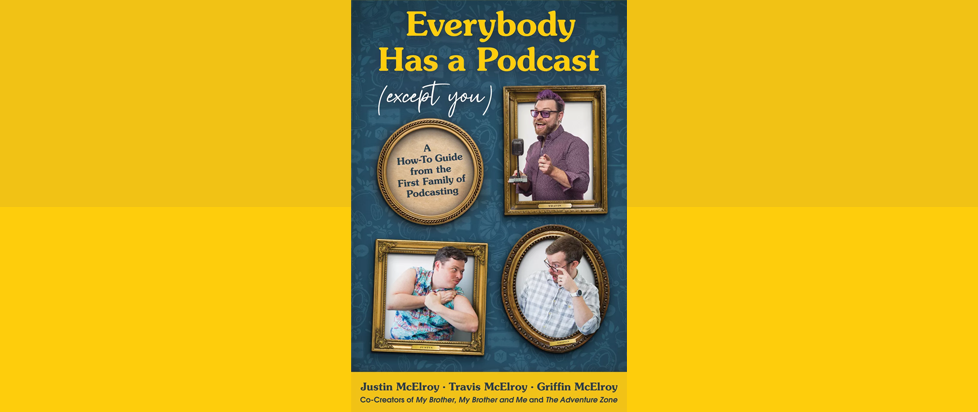
Everybody Has a Podcast (Except You) Review
There are few people more qualified to write a book about podcasting than the McElroy brothers. They’ve been doing it for over a decade, their last name is now practically a branded network unto itself full of popular podcasts: My Brother, My Brother and Me, Sawbones, The Adventure Zone, etc. This year they released that book in Everybody Has a Podcast (Except You): A How-to Guide from the First Family of Podcasting.
The book is written by the three brothers Justin, Griffin and Travis McElroy (with a few appearances from their wives and co-hosts Dr. Sydnee, Rachel, and Teresa McElroy). It covers everything that you’d expect it to cover from the topic of which mic you’ll need to purchase, to how to do basic market research, and when to decide to make merch or do a live show.
With that in mind, I’m not actually sure who this book is for.
Everybody Has a Podcast has a tone problem. Part of this comes from the style of the McElroy’s writing, which places an emphasis on their own particular brand of conversational and self-deprecation. If you’re familiar with them from any of their previous work, the words here flow in a lot of the same way as the spoken form. But this style is a bit at odds with the actual content of the work here, which sometimes gets to be quite technical. There’s something sort of twee about the writing but then it’s immediately and jarringly juxtaposed with discussions of things that would be far past the tone.
There’s a section discussing whether you should eat or drink on your podcast; Griffin recommends only drinking alcoholic beverages if “you’re at your most charming when you’ve got one in you.” I admittedly don’t have access to their user stats, but anecdotally the McElroy fandom seems to skew kind of young so it seems odd to give alcohol advice. But then this book is also for people running a podcast and has a recommendation in it for a $500 mic, so maybe this works for their target demographic of people who would be charmed by the McElroy patter and also be old enough to drink. The book frequently whips between highly specifically technical and that parasocial familiarity that has been the McElroy brand for a decade. There is literally a page between Griffin introducing a section with the phrases “Now it’s time to decide…how big…to make those bones. General bone-size stuff.[sic]” and then explaining with stats and figures from the 2017 National Association of Broadcasters convention that your podcast should be a specific length if you want to maintain consistent listenership. It is difficult to express how jarring this is in the context of the book itself. This paragraph itself may make it seem like Griffin, of the three writers, is the main offender in this regard but he isn’t. All three of them do this tonal shift to some extent; they could not decide whether to write a technical manual or a comedy book and instead wrote a confused lovechild of the two.
The tone isn’t the only issue. The advice they give throughout is good — make sure to run your podcast by others before making it live, for example, or to consider your audience in the process of making your podcast. But it’s uneven in its technical understanding. Advice books need to hit a sweet spot of giving the right amount of advice for the audience of course, but again I’m not sure who this book is for. There will be pages of technical dissection on how to use Audacity or how to pick a co-host — which are incredibly basic introductory skills — but they’re in the same book as a section detailing what to do when you get to the point where you have your own live show and honestly those are worlds apart. It makes the end product feel a bit unfocused even when the advice given is good.
And a lot of the McElroy advice is solid, especially to newcomers to the podcast market. I heard a lot of the best advice in 2017 at GDEX when Justin and Travis gave a talk entitled “Please Learn From Our Podcasting F*** Ups.” It’s a good talk and it doesn’t suffer from one of the major problems that persists throughout Everybody Has a Podcast: constantly undercutting itself in the name of humor.
“Just a warning that I (Justin) am getting way the hell out of my depth here in this section, as it deals with a lot of acoustic science that I barely understand. But listen, you just need to trust me, okay? I’m a professional podcaster, and you’ve already paid for the book.”
I had a writing workshop teacher once who gave me a piece of advice that has always stuck with me; “never apologize at the start of your work, it makes your reader immediately dismiss everything that follows.” This isn’t even novel advice — here’s a tweet about an illustration professor basically giving the same critique. It’s a bold move to start a section (entitled “The Beautiful Pillow Room”) with a warning that you should disregard the contents therein, and one that I’m not sure entirely pays off. It’s also a disclaimer that is ultimately unnecessary as the section is fairly standard acoustic soundproofing advice that doesn’t require an experts opinion and basically boils down to “fuck around and see what sounds right.” (That’s not a knock, I’m a big fan of that.) I know that the McElroy brand revolves around a certain level of self deprecation but it is frequent in this book, a kind of narrative undercutting that serves as a massive disservice to the actual content. “Has anyone out there ever dreamed of watching a grown man pull several paragraphs of legal-sounding text out of his ass? Keep your eyes on my brother as he does exactly that!” Justin’s cheeky faced picture promises from a sidebar before a section where Griffin talks about the vagaries of fair use. And I get it, fair use is a complicated issue. But realistically you’ve purchased this book to listen to experts, and not to be told that they’re not experts.
If they felt unprepared to write a book of advice on podcasts, or specifically to write these sections, why didn’t they call in reinforcements? For the section on research, for example, they brought in Dr. Sydnee McElroy to talk specifically about methodology and resources. It’s a section made richer by her experience — which with 10 years in the business the McElroys generally have — but also because she knows what she’s talking about specifically. As such the section goes into specifics on how to research, how to make corrections and when to make the executive decisions on what makes it into your podcast and what doesn’t, and whether to share your sources or not (she suggests that you do). It’s a stronger chapter for her inclusion. If they needed to call in a sound engineer or their lawyer to write quick sidebars it would have only increased the value of their advice and allowed them to shine in the sections where they actually do their best work — talking about interpersonal relationships.
The strength of the book is easily in the first third, which focuses on what you do before you even press record on your audio recorder of choice. Every time the brothers talk about engaging with other people, Everybody Has a Podcast is at its strongest. There are sections on chemistry and understanding the difference between someone being a good friend and actually having good on set chemistry, or the right types of questions to ask someone that you send your podcast drafts to get feedback on. These sections, more so than literally any of the technical sections, are the heart and soul of Everybody Has a Podcast, and if the book had been just that I think it would have been really solid.
That isn’t to say that all of the interpersonal segments are flawless either. There’s a section early on in pre-production written by Travis McElroy about finding co-hosts; he covers what you’d expect — you need someone that you get along with, your best friend isn’t necessarily a good co-host, not every podcast needs a co-host. At one point he has a section headed “Include Different Points of View” which is interesting in the way it kind of dances around some pretty big points of view. Travis discusses how one of his (now-defunct) podcasts “Trends Like These” was made richer because they expanded their hosting team to include Courtney Enlow, whose inclusion helped to expand the team beyond “two cisgender men.” But looking at the entire lineup of McElroy Family podcasts there appears to be only one person in all of the podcasts who isn’t white (on a podcast that no longer appears to be active). Obviously this is a family business but a lot of the podcasts bring in friends and industry members and yet the lineups are still overwhelmingly white. It seems weird to give lip service to “include underrepresented voices” when it doesn’t seem like they do the same in their own works.
Overwhelmingly, the biggest thing that I got out of Everybody Has a Podcast is confusion. The book has its good moments, sections where you can see the strength of its writers and their experience, but it is hobbled by the inability to focus on a specific tone or audience. For a lot of people, mostly fans of the McElroy’s, this will probably not be an issue. But then, they are likely to read the book anyway.
This book was supplied for review from Harper Perennial. Interested in Everybody Has a Podcast (Except You)? Buy it through our Bookshop affiliate link.





